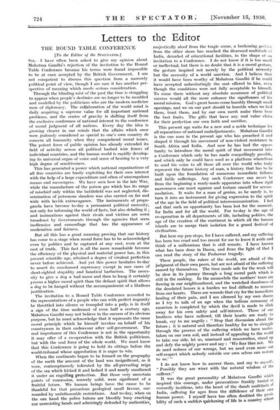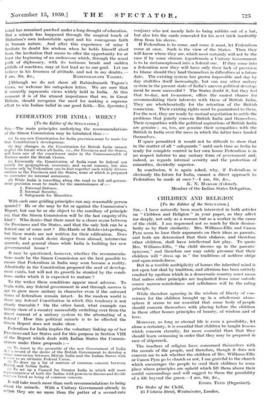Letters to the Editor
THE ROUND TABLE CONFERENCE
[To the Editor of the SPECTATOR.] Sin,— I have often been asked to give my opinion about Mahatma Gandhi's rejection of the invitation to the Round Table Conference because his terms were found impossible to be at once accepted by the British Government. I am not competent to discuss this question from a narrowly political point of view, though I am sure it has another per- spective of meaning which needs serious consideration.
Through the blinding mist of the past the time is struggling to appear when people's destinies are no longer to be moulded and modelled by the politicians who are the modern medicine men of diplomacy. The collaboration of the world mind is daily acquiring a supreme value for all important national problems, and the centre of gravity is shifting itself from the exclusive conference of national interest to the conference of moral judgment of all nations. Every day the idea is growing clearer in our minds that the affairs which once were jealously considered as special to one's own country do concern all humanity when they comprehend moral issues. The potent force of public opinion has already extended its field of activity across all political barbed wire fences of individual countries, and the human world is rapidly develop- ing its universal organ of voice and sense of hearing to a very high degree of sensitiveness.
This has generated a power which national organizations of all free countries are busily exploiting for their own interest with the help of a large expenditure and often of unscrupulous means and messengers. We have seen how in the late War, while the manufacture of the poison gas which has its range of mischief only within the battlefield was not neglected, dis- semination of poisonous slanders was also carried on far and wide with lavish extravagance. The instruments of propa- ganda have become to-day a permanent political necessity, not only for informing the world of facts, but also deluding it ; and insinuations against their rivals and victims are sown broadcast by Governments through the agencies that seem inoffensive and camouflage that has the appearance of moderation and fairness.
But all this has a great meaning proving that our history has come to a stage when moral force has to be acknowledged even by politics and be captured at any cost, even at the cost of truth. This fact is all the more remarkable because the efficiency of the physical and material power has, in this present scientific age, attained a degree of virulent perfection never before achieved. And yet this power hesitates to-day to assert its unashamed supremacy except in rare cases of short-sighted stupidity and fanatical barbarism. The neces- sity to give a dog a bad name and then to hang it certainly proves a higher moral spirit than the defiant spirit that allows a dog to be hanged without the accompaniment of a libellous justification.
The invitation to a Round Table Conference accorded to the representatives of a people who can with perfect impunity be throttled into silence or trampled into a pulp, is in itself a sign of the time. undreamt of even half a century ago. Mahatma Gandhi may not believe in the success of its obvious purpose, but be must acknowledge that it represents the same moral principle which he himself invokes on behalf of his countrymen in their endeavour after self-government. The real importance of this Conference is not in the opportunity it may offer of a co-operation with the British politicians, but with the soul force of the whole world. We must know that this Conference is going to hold its sittings before the world-tribunal whose approbation it is eager to win.
When the continents began to be formed on the geography of the earth the amount of the land was insignificant, as it were, contemptuously tolerated by the all-pervading reign of the sea which kicked It and lashed it and nearly smothered it under an engulfing protection. But those very uncertain points of concession, scarcely solid, were significant of a fruitful future. We human beings have the cause to he thankful for that precarious geological small favour, sur- rounded by unfathomable restrictions. And to-day, when on the one hand the police batons are bloodily busy cracking our unresisting heads and admiringly defended by authorities,
majestically aloof from the tragic scene, a beckoning gesture from the other shore has reached the disarmed multitude of India, denuded of educational facilities, in the shape of an
invitation to a Conference. I do not know if it is too small or ineffectual, but there is no doubt that it is a moral gesture, the gesture inspired not merely by the political necessity but the necessity of a world sanction. And I believe that it would have been worthy of Mahatma Gandhi if he could have accepted unhesitatingly the seat offered to him, even though the conditions were not fully acceptable to himself. To come there without any absolute assurance of political success would all the more enhance the significance of his moral mission. God's great boons come humbly through small openings, and we on our part should be humble when we hail
them, trust them, and by our own merit make them bear the best fruits. The gifts that have any real value claim for their perfection our own faith and sacrifice.
This present age waits for a new and a noble technique for all reparations of national maladjustments. Mahatma Gandhi is the one man in the present age who has preached it and
shaped it through his movement of non-violent resistance in South Africa and India. And now he has had the oppor- tunity to introduce the moral spirit of that movement into a Conference which only he has made compellingly possible, and which only he could have used as a platform wherefmm to send his voice to all those all over the world who truly represent the future history of man, a history that has to be built upon the foundation of numerous immediate failures and futile sufferings. Any such Conference can never be from the beginning a ready-made apparatus into whose rigid narrowness one must squeeze and torture oneself for accom- modation. It waits for a man of genius, as he surely is, to turn it into an instrument for giving expression to the spirit of the age in the field of political intercommunication. I feel sad that such an opportunity has been lost for the moment, for India and for all the world. For to-day is the age of co-operation in all departments of life, including politics, the age of the creation of the continent in which all the human islands are to merge their isolation for a grand festival of civilization.
But here my pen stops, for I have suffered, and my suffering has been too cruel and too recent for me to leave it aside and
think of a millennium that is still remote. I have known what has been done in Dacca, and from the light of that I can read the story of the Peshawar tragedy.
These people, the rulers of the world, are afraid of the judgment of their own peers, but are not afraid of the suffering caused by themselves. The time made safe for the weak will
be slow in its journey through a long moral path which is still in the making. In the meanwhile the mothers' tears are
flowing in our neighbourhood, and the wretched dumbness of the desolated homes is a burden we find difficult to remove from our hearts. There are wounds that cry for the immediate healing of their pain, and I am silenced by my own shame as I try to talk of an age when the tedious ceremony of exorcism is completed by which the devil is made to slink
away for his own safety and self-interest. Those of our brothers who have suffered, till their hearts are ready to break, cry to me angrily " Stop that discussion about the future ; it is natural and therefore healthy for us to struggle through the process of the suffering which we have under- taken on our own soil, and instead of appealing to the world to take our side, let us, unarmed and resourceless, stand up and defy the mighty power and say ; We fear thee not. We do need redress of our wrongs, but we need even more our self-respect which nobody outside our own selves can restore to us.' " I do not know how to answer them, and say to myself: " Possibly they are wiser with the natural wisdom of the sufferer." It was the great personality of Mahatma Gandhi which inspired this courage, under persecutions frankly brutal or cowardly insidious, into the heart of the dumb multitude of India, suffering for ages from the diffidence of their own human power. Imyself have too often doubted the possi• bility of such a sudden quickening of life in a country whose
mind has remained parched under a long drought of education. But a miracle has happened through the magical touch of Mahatma's own indomitable spirit and his courageous faith in human nature. And after this experience of mine I hesitate to doubt his wisdom when he holds himself aloof from the invitation that seems to offer the opportunity for at least the beginning of an endeavour which, through the usual path of diplomacy, with its tortuous bends and sudden pitfalls of reactions, may at last lead us to our goal. Let me believe in his firmness of attitude, and not in my doubts.—
[Although we do not share all Rabindranath Tagore's views, we welcome his outspoken letter. We are sure that it correctly represents views widely held in India. At this moment it is of the utmost importance that we, in Great Britain, should recognize the need for making a supreme effort to win Indian belief in our good faith.—ED. Spectator.]









































 Previous page
Previous page